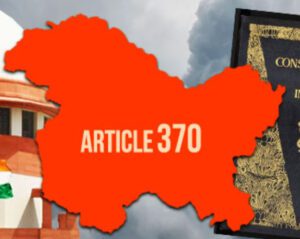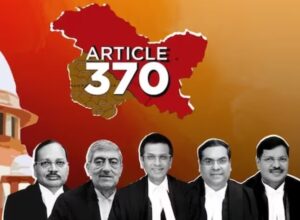Article 370 in the Indian Constitution was like a temporary arrangement for Jammu and Kashmir. It gave the state special rights, letting it have its own laws, a separate flag, and control over many matters, except for foreign affairs, defense, and communications.
The article also said that the local assembly in Jammu and Kashmir could decide how much of the Indian Constitution would apply to the state. This arrangement created a unique status for Jammu and Kashmir. However, in 2019, the Indian government made a big change by ending this special status and applying the Indian Constitution fully to the region. In this article “What Is An Article 370 and SC Verdict On Abrogation Of Article 370 Explained” we will talk about changes during and after Article 370 and reactions of people on this act.
|
|
How Article 370 Was Made in Indian Constitution:
Origins and Context:
Special Autonomy:
Limited Applicability of Indian Laws:
Preservation of State Autonomy:
Temporary Provision:
Changes Leading to Abrogation:
What were the Rules during Article 370 in Jammu Kashmir
Before the abrogation of Article 370 in 2019, Jammu and Kashmir had special autonomy within the Indian Union. The region had its own constitution, flag, and a considerable degree of autonomy in decision-making. Some key aspects of the special status and rules in Jammu and Kashmir under Article 370 included:
1. Autonomous Constitution:
Jammu and Kashmir had its own constitution, separate from the Indian Constitution. This allowed the state to have its own set of laws and regulations.
2. Special Rights for Residents:
The state laws defined permanent residents, and these residents had special rights and privileges, including exclusive rights to own property and access to government jobs.
3. Limited Applicability of Indian Laws:
The jurisdiction of the Indian Constitution over Jammu and Kashmir was limited. While defense, foreign affairs, and communications were under the purview of the Indian government, the state had the authority to make its own laws on other subjects.
4. Dual Citizenship:
Residents of Jammu and Kashmir were considered citizens of the state as well as Indian citizens. They were subject to both state laws and the Indian Constitution.
5. No Right to Information (RTI):
6. Separate Flag:
Jammu and Kashmir was allowed to have its own flag, in addition to the national flag of India.
The Rules After Abrogation of Article 370 in Jammu Kashmir
1. Revocation of Special Status:
2. Reorganization into Union Territories:
Jammu and Kashmir was reorganized into two separate Union Territories – Jammu & Kashmir and Ladakh. This move altered the administrative structure, with Union Territories having a different governance framework compared to full-fledged states.
3. Application of Central Laws:
4. Abolition of Special Rights:
5. Integration with Central Programs:
Jammu and Kashmir is now fully integrated into various central government programs and initiatives, allowing residents to avail themselves of the benefits offered by the central government.
6. Economic and Administrative Changes:
The abrogation of Article 370 also paved the way for economic and administrative reforms in the region. The central government aimed to promote development, investment, and employment opportunities in Jammu and Kashmir.
It’s important to note that the changes following the abrogation of Article 370 have been a subject of both support and criticism.
What were The Reactions of People After Abrogation Of Article 370
The abrogation of Article 370 in August 2019 elicited a variety of reactions from people in Jammu and Kashmir as well as across India. These reactions were diverse and often reflected the complex socio-political landscape of the region. It’s important to note that opinions on this matter can vary widely, and the responses outlined below are not exhaustive:
Reactions in Jammu and Kashmir:
Support: There were individuals in Jammu and Ladakh who supported the abrogation, believing that it would lead to greater integration with the rest of India and foster economic development in the region.
Opposition: The move faced strong opposition from some segments of the population in the Kashmir Valley. Critics argued that it undermined the special status and autonomy that Jammu and Kashmir had enjoyed for decades.
Concerns about Identity and Rights: Many in the Kashmir Valley expressed concerns about the potential impact on their cultural and political identity. There were apprehensions about the loss of special privileges, including exclusive land ownership rights.
Security Apprehensions: The region experienced heightened security measures following the abrogation, leading to concerns about civil liberties and restrictions on movement.
Reactions in India:
Support: The abrogation received widespread support in many parts of India. Supporters saw it as a historic step toward national integration, equality, and the extension of equal rights to all citizens of the country.
Economic Development: Many believed that the move would pave the way for economic development in Jammu and Kashmir, leading to increased investment, job opportunities, and infrastructure development.
National Security: Some supporters argued that the move would strengthen national security by facilitating better integration of the region with the rest of the country and enabling more effective counter-terrorism measures.
Political Divisions: The abrogation of Article 370 also led to political divisions, with different political parties taking varying stands on the issue. The response was not uniform across party lines.
It’s important to recognize that opinions on the abrogation of Article 370 are diverse, and individual perspectives are shaped by a range of factors, including political beliefs, regional affiliations, and cultural identity.
SC Verdict On Abrogation of Article 370
The Constitutional Bench of five judges heard the petitions challenging the decision to abrogate Article 370 in the Supreme Court on Monday. Chief Justice N.V. Ramana presided over the bench, which included Justices Sanjay Kishan Kaul, Sanjiv Khanna, B.R. Gavai, and Suryakant. The top court had reserved its judgment in this case on September 5 after a 16-day-long hearing. Throughout the proceedings, the Supreme Court heard arguments from the Attorney General K.K. Venugopal, Solicitor General Tushar Mehta, Senior Advocate Harish Salve, Rakesh Dwivedi, V. Giri, and others representing the central government and intervenors.


